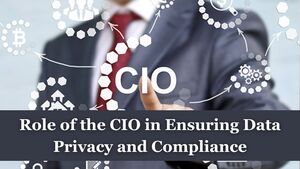-
 Retrouver dansMembres
Retrouver dansMembres Retrouver dansVidéos
Retrouver dansVidéos Retrouver dansChaînes
Retrouver dansChaînes
This website uses cookies to ensure you get the best experience on our website.
To learn more about our privacy policy Cliquez iciPréférence de confidentialité
- Mots clés - #Data privacy #Compliance #CIO
-
- Dernière mise à jour 14 août 2024 0 commentaire , 162 vues, 0 comme
- Mumbai, Maharashtra, India - Obtenir des directions
More from Ajay tie
More in Politics
Related Blogs
Les archives
Role of the CIO in Ensuring Data Privacy and Compliance
Corps
Introduction
In today's digital landscape, data privacy and compliance have become critical concerns for organizations. The Chief Information Officer (CIO) plays a pivotal role in ensuring that these aspects are managed effectively. The CIO's responsibilities in this area extend beyond just IT management; they encompass governance, risk management, and strategic leadership.
Understanding Data Privacy
Data privacy is about ensuring that personal and sensitive information is handled responsibly. The CIO must understand the regulatory requirements surrounding data privacy, such as GDPR, CCPA, and other local laws. These regulations dictate how data should be collected, stored, and shared. The CIO is responsible for implementing policies that align with these regulations and ensuring that the organization's data handling practices meet compliance standards.
Establishing Data Governance
Data governance involves creating a framework for managing data across the organization. The CIO must establish clear guidelines on how data is to be used, who has access to it, and how it is protected. This includes setting up data classification systems, access controls, and encryption methods. The CIO also needs to ensure that employees are trained in data governance policies to prevent breaches and misuse of data.
Risk Management and Compliance
One of the key roles of the CIO is to manage the risks associated with data privacy. This involves conducting regular risk assessments to identify potential vulnerabilities and implementing measures to mitigate these risks. The CIO must also ensure that the organization has a robust incident response plan in place, which outlines the steps to be taken in the event of a data breach.
Compliance is another critical area of focus. The CIO must work closely with legal and compliance teams to stay updated on changes in regulations and ensure that the organization's data practices are in line with these changes. This may involve regular audits, compliance checks, and updating policies to reflect new legal requirements.
Leveraging Technology for Data Privacy
The CIO can leverage various technologies to enhance data privacy and compliance efforts. Tools such as data encryption, anonymization, and secure data storage solutions are essential for protecting sensitive information. Additionally, the CIO should explore the use of AI and machine learning for monitoring data usage and identifying potential privacy risks in real-time.
Fostering a Culture of Privacy
Ensuring data privacy and compliance is not just about implementing the right tools and policies; it's also about fostering a culture of privacy within the organization. The CIO must lead by example, emphasizing the importance of data privacy in all business processes. This includes regular training sessions for employees, creating awareness about the risks of non-compliance, and promoting best practices for data handling.
Conclusion
The role of the CIO in ensuring data privacy and compliance is multifaceted and increasingly important in today's data-driven world. By establishing strong governance, managing risks, leveraging technology, and fostering a culture of privacy, the CIO can ensure that the organization not only complies with regulations but also builds trust with its customers and stakeholders.
Photos
Carte
-
Emplacements sur MyWorldGo
Information de Lieu
- Emplacement: Mumbai, Maharashtra, India - Obtenir des directions
- Adresse formatée: Mumbai, Maharashtra, India
- Adresse de rue: Mumbai
- Ville: Mumbai
- Etat: Maharashtra
- Pays: India











commentaires